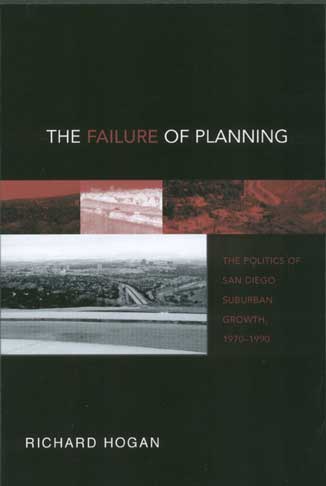The Failure of PlanningPermitting Sprawl in San Diego Suburbs, 1970–1999Richard HoganUrban Life and Urban Landscape |
 05/02/2003 304 pp. 6x9  $24.95 paper 978-0-8142-5104-1 Add paper to shopping cart $49.95 cloth 978-0-8142-0923-3 Add cloth to shopping cart $14.95 CD 978-0-8142-9005-7 Add CD to shopping cart Shopping Cart Instructions Review/Change Shopping Cart & Check-out | |||
|
|
“[Hogan's] study is extraordinarily valuable because it reveals a process in which grotesque results emerge from the rational behavior of actors bound together in a particular kind of market. . . . Across the country we are building settlements without community—corporate designed, mass produced, profit maximizing, uniformly boxy, bare, townless, unaffordable, SUV settlements that are life-centered only in the sense of requiring a lifetime of commuting. Hogan’s frustration shows, but maybe that is because he is in touch with the mood of many Americans.” —Contemporary Sociology “The Failure of Planning is a literate and cogent study of a major U.S. city and its suburban and exurban areas. It uses class analysis and other highly respected paradigms in a way to help us profoundly understand how planning under the present structure of ‘republican capitalism’ rewards those who learn how to engage and use the planning system, those who can afford to be patient and who can finesse planners and politicians alike, and those who understand that popular citizen initiatives can actually be used to frustrate the search for viable solutions to community problems that will be sustainable, fair, environmentally sensitive and sensible, and just. This is an important post-modernist critique of contemporary urban/regional planning.” —Mark Lapping, Edmund S. Muskie School of Public Service, University of Southern Maine By 1970, uncontrolled growth plagued San Diego County suburbs and threatened to destroy the “paradise” of postwar San Diego, which had attracted a flood of immigrants since 1945. Fortunately, Mayor Pete Wilson, fresh from a Rockefeller Brothers land-use policy forum and armed with the latest progressive planning vision, sponsored a “big picture” planning solution, which has since been institutionalized as “smart growth.” Despite the triumph of progressive planning, however, and the multimillion-dollar-planning effort that continues to characterize suburban development, suburban sprawl continues. Freeway gridlock continues. Already exorbitant housing costs keep rising. In short, progressive planning has failed. This book explains how and why this has happened, not only in San Diego but more generally, and considers conservative, liberal, and radical paths toward a more successful future. In this critique of city planning based on “republican capitalism” (the supposed base of all things “American”), Richard Hogan argues that planning in San Diego has been an abysmal failure and offers his own utopian view for the future of urban planning. Whether people love or hate this book, it is sure to get attention from urban historians and city planners alike.
| |||


